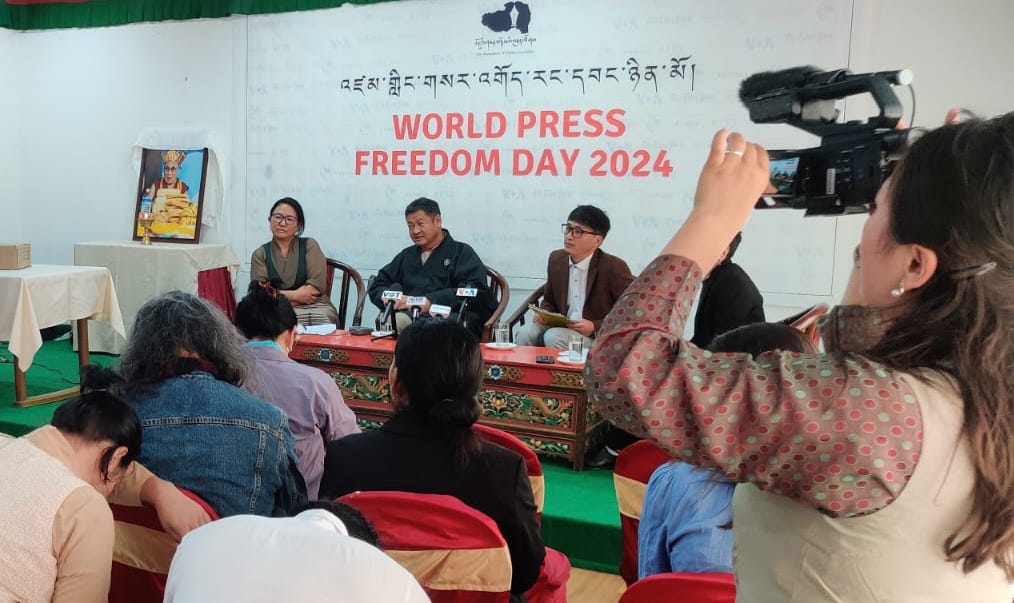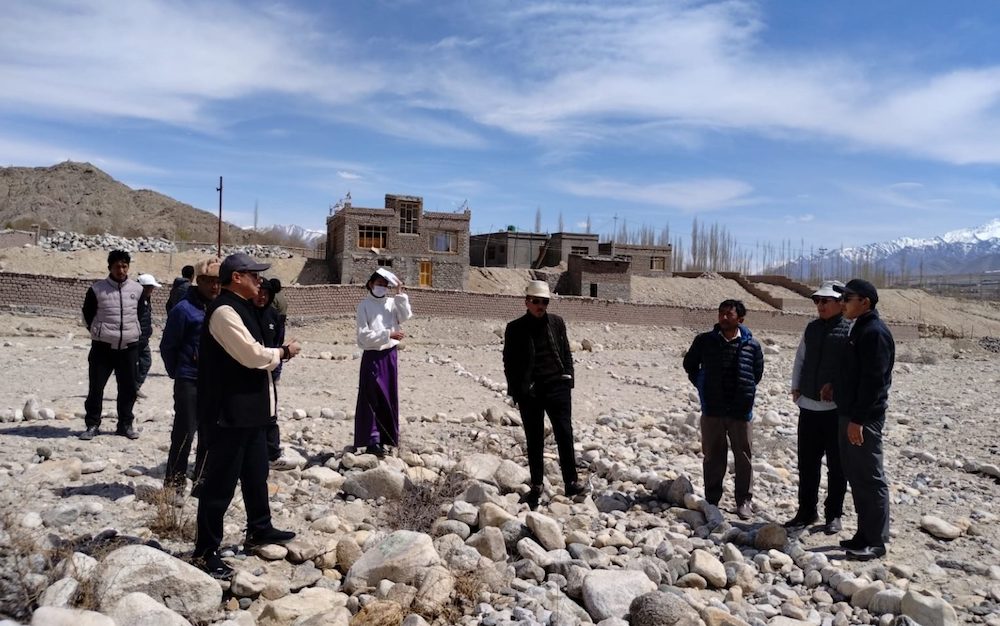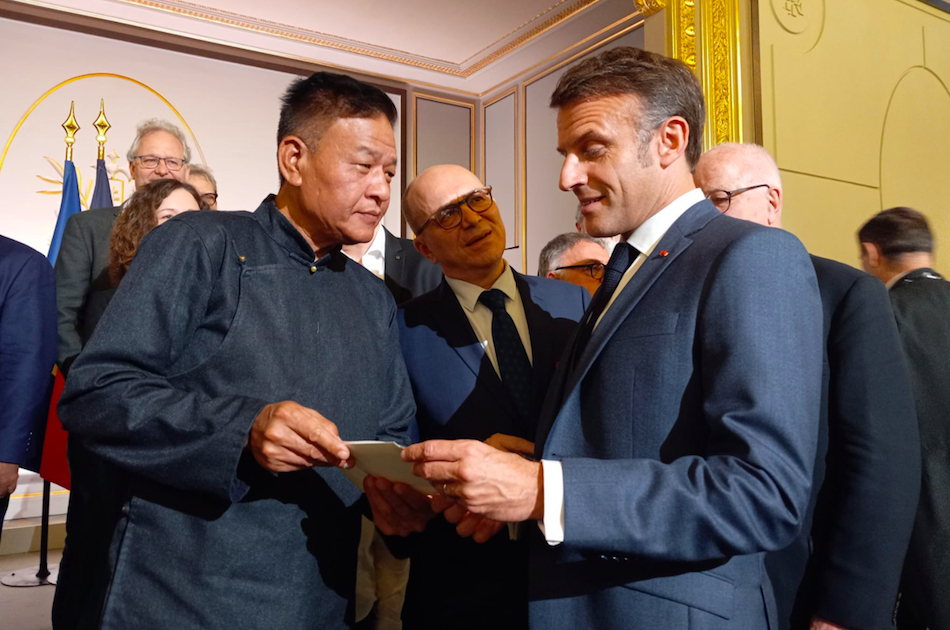By Sergey Chernov
Staff Writer
 Activists who came to support the people of Tibet and protest human rights violations in the region found themselves outnumbered by Chinese students who came to counter the rally in St. Petersburg on Saturday.
Activists who came to support the people of Tibet and protest human rights violations in the region found themselves outnumbered by Chinese students who came to counter the rally in St. Petersburg on Saturday.
More than 100 Chinese people, with Chinese flags, pro-Beijing Olympics slogans, red carnations, and Chinese state symbols stuck to their faces, were sent away by the police who said their meeting was “unsanctioned.” The police also checked the documents of the most active young people who after a while left reluctantly.
The rally, which drew around 50 protesters, was the first meeting in support of Tibet in St. Petersburg since the Chinese government’s ongoing brutal clampdown in Tibet, in which exiled Tibetan leaders claim up to 150 people have been killed in recent weeks.
Previously, a meeting scheduled for late March was postponed under pressure from the authorities who tried to stifle any protests before and during the Olympic torch relay in St. Petersburg early last month.
The meeting featured activists from the St. Petersburg Friends of Tibet Society, presided by Margarita Kozhevnikova. Apart from local participants, visitors from Kalmykia and Tuva, where Buddhism is the main religion, took part, as well as three Tibetans. One of them, philosophy professor Geshe Dakpa Jampa, gave a speech in his native language.
Slogans included “My Heart Is With Tibet,” “Freedom to the Political Prisoners,” “Today – Tibet, Tomorrow – ?,” “No to Violence in Tibet,” “Free Tibet” and “Save Tibet.” One poster demanded the immediate release of the 11th Panchen Lama, Gedhun Choekyi Nyima, who was kidnapped by the Chinese authorities in 1995. The Panchen Lama is one of the most important religious authorities in Tibet.
Activists also distributed materials about the situation in Tibet, which is covered in Russian media mainly from a pro-China position, and collected signatures.
 “First of all, it was a call for peaceful resolution of the crisis in Tibet, and, secondly, a call to [the Russian authorities] to let the Dalai Lama into Russia,” said Yelena Kim, an activist with the Friends of Tibet Society.
“First of all, it was a call for peaceful resolution of the crisis in Tibet, and, secondly, a call to [the Russian authorities] to let the Dalai Lama into Russia,” said Yelena Kim, an activist with the Friends of Tibet Society.
The Dalai Lama has been repeatedly denied a Russian visa since 1996. He was allowed to enter Kalmykia for a one-day visit in 2004.
The slogan “Freedom to the Political Prisoners” first referred to the Panchen Lama, Kim said.
“He is the youngest political prisoner who was kidnapped at the age of six and nothing is known about him,” she said.
“But recently there was a wave of arrests, and there are so many political prisoners now, I can’t imagine how many, that we decided to write about them all.”
Last week, a Chinese court sentenced 30 people, including six monks, to jail terms ranging from three years to life in prison.
Some of the Chinese students returned when the rally was underway.
A young woman with a small Chinese flag on her cheek told Russians standing next to her that what was said at the rally was “lies,” while a young man who was insistent in waving the Chinese flag and shouting “One China” was detained by the police after a document check, as he happened not to have his registration document, although he had his passport and student card.
Several members of the Yabloko democratic party took part in a rally. Maxim Reznik, the head of the local branch who spent three weeks in custody in what he calls a fabricated case in March, took time to hold one of the rally’s banners reading “Freedom to Political Prisoners.”
“I am taking part simply as a citizen, because I have great respect for Tibetan culture,” said Reznik. “When Tibetan culture and the Buddhist religion are for me linked to words like ‘peace’ and ‘kindness,’ I feel the objections to the fact that these great people [are treated] so unfairly even more deeply.
“It’s part of our diverse world, which is beautiful because of such little islands, and when it’s unified, destroyed it provokes protest. As Hemingway wrote, ‘Do not ask for whom the bell tolls, it tolls for thee.’
“It doesn’t matter where human rights are violated. But here, I feel there is some special injustice, because they are such peaceful people. […] On the one hand, I feel shock, but on the other hand, I don’t feel hatred toward China – just a wish to support these people, help them, to explain to the leadership of the Chinese People’s Republic that they shouldn’t destroy what belongs to the whole world, rather than to them.”
Alexander Gudimov, the deputy chairman of the local branch of Youth Yabloko, the youth section of the democratic party, who was detained when he attempted to hold a solitary picket near the Chinese Consulate on the day when the Beijing Olympic flame relay passed through St. Petersburg last month, also took part in the rally.
Musician Yevgeny Fyodorov, the frontman of alternative rock band Tequilajazzz, said he came because it was the first rally in support of Tibet in St. Petersburg as far as he knew.
“I came because we see that such things start to happen here at last,” he said. “[Pro Tibet protests] have taken place in every country, on every continent, except maybe Africa. Because of the Olympics, Tibet got the chance to remind [the world] about itself. It didn’t happen here for some reason.
“I am pessimistic about China giving any concessions, but I came to support these very likeable people. I sympathize with and have a great interest in Tibetan Buddhism, that’s why it’s very relevant to me.”
A second meeting that was planned to be held on Turgenev Ploshchad, near the Chinese Consulate, later the same day, was not allowed by the district administration because it said work such as planting bushes and flowers, and fence and path repairs, was taking place in the area.
But on Saturday, no sign of any work at the site was detected.









